article Learning Community: Supportive Housing Models that Work
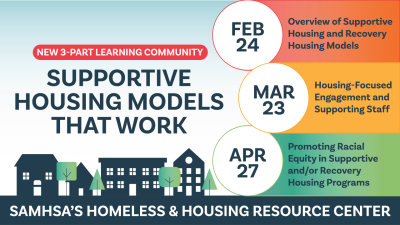
This Learning Community is being offered to those who have completed the HHRC 4-hour online training course titled Introduction to Housing Models, Housing Navigation, and Engagement or those with strong foundational knowledge and experience of best practices in supportive housing who are interested in more in depth content on using supportive housing to address the needs of individuals experiencing homelessness with serious mental illness, serious emotional disturbances, substance use disorder or co-occurring disorders. The presenters offer guidance on best and promising practices as well as practical lessons learned from on-the-ground experience.
In this three-part series, attendees will learn innovative ways to center equity and the perspective of those with lived experience to support individuals experiencing homelessness with behavioral health needs in securing and sustaining affordable housing paired with supportive services that meet their needs and preferences.
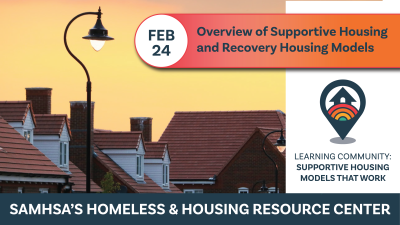
Session 1: Overview of Supportive Housing and Recovery Housing Models, February 24, 2022 2:30-4:00 pm ET
Hear from subject matter experts and a community provider about the range of supportive housing and recovery housing models and practices that assist individuals in accessing and sustaining housing and promoting improved health, wellness, and recovery. This session will cover:
- Recovery and Racial Equity as guiding principles
- Considerations in serving varied populations
- Permanent Supportive Housing (PSH)/Housing First and Recovery Housing principles and practices
Speakers
- Alison Korte, MSW, Senior Associate, TAC
- Rachel Post, MSSW, Senior Associate, TAC
- Bill Stein, LICSW, Director of Clinical Training & Workforce Development, House of Hope, Rhode Island
- Jacqueline Mercado, Housing Case Manager, House of Hope
- Brady Dunklee, Program Manager, Integra Community Care Network
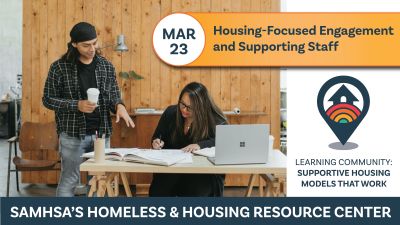
Session 2: Housing-focused Engagement and Supporting Staff, March 23, 2022 2:30-4:00pm ET
Hear from subject matter experts and a community provider about evidence-based practice interventions used to successfully engage individuals in accessing and sustaining housing, improve health, wellness, and recovery, and how to support staff in utilization of these interventions. This session will cover:
-
Trauma-Informed Practices, Motivational Interviewing, Harm Reduction
-
Incorporating peer providers in program design, implementation, and service delivery
-
Equitable hiring practices, training, supervision, and performance measures
-
Exploring the role that states and local behavioral health agencies can play in establishing provider requirements around incorporating these practices
Speakers
- Alison Korte, MSW, Senior Associate, TAC
- Rachel Post, MSSW, Senior Associate, TAC
- Liz DaCosta, Senior Director of Housing and Community Integration, Community Bridges, Inc., Arizona
- Tanya Alegria, PATH Program Manager, Community Bridges, Inc., Arizona
- Matt Kelly, Lead Housing Liaison, MercyCare, Arizona
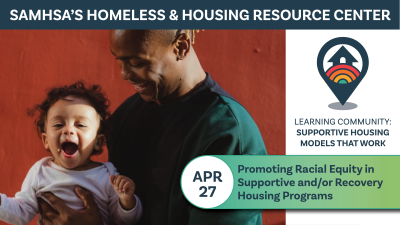
Session 3: Promoting Racial Equity in Supportive and/or Recovery Housing Programs, April 27, 2022 2:30-4:00pm ET
Hear from subject matter experts and a community provider on strategies for ensuring promotion of racial equity in supportive and/or recovery housing programs. This session will cover:
- Developing equitable policies and procedures that center the perspective of those with lived experience and promote evidence-based practices
- Racially equitable service delivery practices
- Program monitoring and continuous quality improvement practices
Speakers
- Alison Korte, MSW, Senior Associate, TAC
- Rachel Post, MSSW, Senior Associate, TAC
- Julia Mines, MSW, Executive Director, Miracles Club, Portland, Oregon
- Eoj Johnson, CADC-R, Operations Manager, Miracles Club, Portland, Oregon
- Sabrina Fields, Director of Housing, St. Joseph Center, Los Angeles, California
- Jacob Salazar, Program Manager SAMHSA PRIME, St. Joseph Center, Los Angeles, California
- Chelsea Mitchell, Peer Specialist SAMHSA PRIME, St. Joseph Center, Los Angeles, California
Learning Objectives for the Series
- Develop deeper understanding of best practices in supportive housing and how to center racial equity and the expertise of those with lived experience in these practices
- Describe key principles of whole-person care and its relevance to addressing the varied needs of individuals served in supportive housing
- Identify practical strategies to build policies, procedures, hiring practices, training and supervision that promote best practice supportive housing that address disparities in access and outcomes of Black, Indigenous and other People of Color (BIPOC)
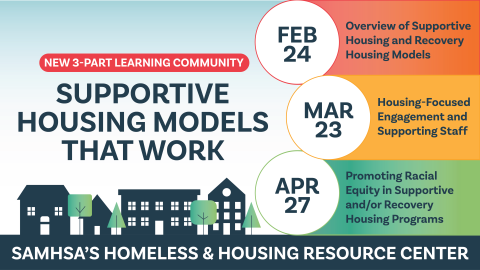
Recent Articles
Classification
- Topic
- Mental Health: Serious Mental Illness
- Co-occurring Disorders
- Housing Models: Housing First
- Housing Models: Permanent Supportive Housing
- Housing Models: Recovery Housing
- Language
- English